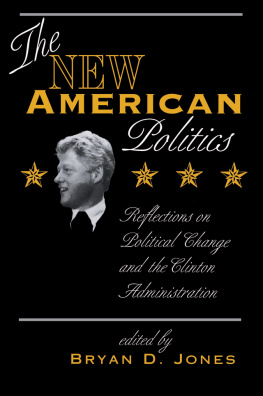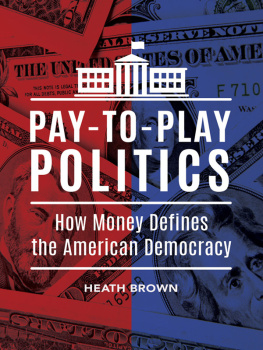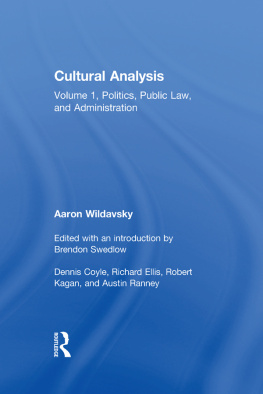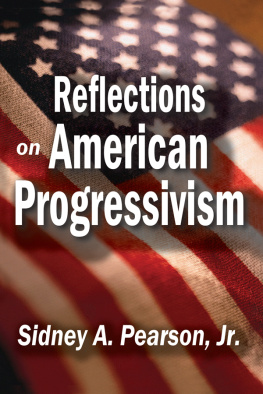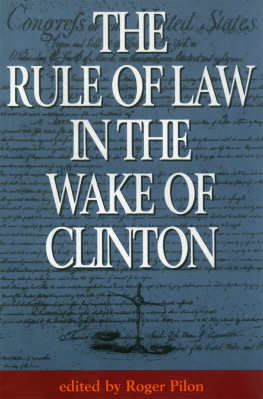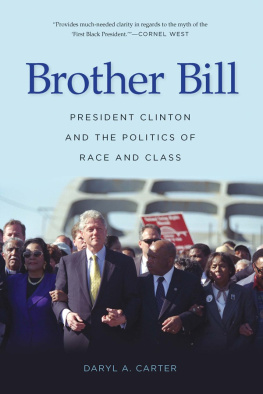Transforming American Politics
First published 1995 by Westview Press
Published 2018 by Routledge
711 Third Avenue, New York, NY 10017, USA
2 Park Square, Milton Park, Abingdon, Oxon OX14 4RN
Routledge is an imprint of the Taylor & Francis Group, an informa business
Copyright 1995 Taylor & Francis
All rights reserved. No part of this book may be reprinted or reproduced or utilised in any form or by any electronic, mechanical, or other means, now known or hereafter invented, including photocopying and recording, or in any information storage or retrieval system, without permission in writing from the publishers.
Notice:
Product or corporate names may be trademarks or registered trademarks, and are used only for identification and explanation without intent to infringe.
Library of Congress Cataloging-in-Publication Data
The New American politics : reflections on political change and the Clinton Administration / edited by Bryan D. Jones.
p. cm.(Transforming American politics)
Includes bibliographical references and index.
ISBN 0-8133-1972-2.ISBN 0-8133-1973-0 (pbk.)
1. United StatesPolitics and government1989-1993. 2. United StatesPolitics and government1993- 3. PresidentsUnited StatesElections1992. I. Jones, Bryan D. II. Series.
JK271.N43 1995
320.973'09'049dc20
94-45163
CIP
ISBN 13: 978-0-8133-1973-5 (pbk)
The New American Politics
Transforming American Politics
Lawrence C. Dodd, Series Editor
Dramatic changes in political institutions and behavior over the past three decades have underscored the dynamic nature of American politics, confronting political scientists with a new and pressing intellectual agenda. The pioneering work of early postwar scholars, while laying a firm empirical foundation for contemporary scholarship, failed to consider how American politics might change or to recognize the forces that would make fundamental change inevitable. In reassessing the static interpretations fostered by these classic studies, political scientists are now examining the underlying dynamics that generate transformational change.
Transforming American Politics brings together texts and monographs that address four closely related aspects of change. A first concern is documenting and explaining recent changes in American politicsin institutions, processes, behavior, and policymaking. A second is reinterpreting classic studies and theories to provide a more accurate perspective on postwar politics. The series looks at historical change to identify recurring patterns of political transformation within and across the distinctive eras of American politics. Last and perhaps most importantly, the series presents new theories and interpretations that explain the dynamic processes at work and thus clarify the direction of contemporary politics. All of the books focus on the central theme of transformationtransformation in both the conduct of American politics and in the way we study and understand its many aspects.
Forthcoming Titles
Unified Gridlock, David Brady and Craig Volden
Broken Contract? Changing Relationships Between Citizens and Their Government in the United States, edited by Stephen C. Craig
Congress and the Administrative State, Second Edition, Lawrence C. Dodd and Richard L. Schott
Governing Partners and State-Local Relations in the United States, Russell L. Hanson
Young Versus Old: Generational Gaps in Political Participation and Policy Preferences, Susan MacManus and Suzanne L. Parker
Cold War Politics, John Kenneth White
1
Continuity and Change in American Politics
BRYAN D. JONES
This book is about the nature of change in the American political system. President Bill Clinton has often stated his belief that his election was about change, or rather the public's desire for change. But many journalists and academic commentators stress stability: The American system, they say, is particularly designed to thwart major and meaningful change. Moreover, the nature of political, social, and economic change itself has been the source of academic controversy. Emblazoned across the title page of Principles of Economics, by the great late-nineteenth century economist Alfred Marshall, is the Latin phrase Natura non facit saltum: Nature does not make leaps. Encapsulating die belief that nature is well-behaved, this aphorism can be traced at least to the biologist Carolus Linnaeus in 1750; but Marshall may have been the first social scientist to popularize it.
In political science, Natura non facit saltum comes in various guises. Indeed, many analysts of American government seem compelled to claim that government not only doesn't make leaps, it doesn't make moves. In 1989 Time carried a cover story entitled "Is the Government Dead?" It seems that so many politicians were beholden to interest groups, so much money was pouring into image-making in elections, and the institutions of government were enmeshed in so much divided control and deadlock that bold leadership at the national level was impossible. From James Madison's schemes to try to make government less oppressive by making it less active, to James McGregor Burns's classic Deadlock of Democracy in the early 1960s, to Time's dead-government claim and Brookings scholars John Chubb and Paul Peterson's book Can the Government Govern? (1989), to the present-day claim that government cannot act because the deficit has gotten too big, it has been fashionable to point to the inherent: inaction and conservatism of national government in the United States. The most recent entries in the "government can't govern" refrain point to interest groups as the problemjournalist Jonathan Rauch calls it "demosclerosis" (Rauch, 1994).
The pessimism regarding the capacity of U.S. government to make major changes carries over into the more abstract analyses of political scientists. The belief in the impossibility of large change can be seen in group theory, where actions always beget reactions and existing interest groups, when threatened, will mobilize to block major disruptions; and in the incremental decisionmaking models, where public decisionmakers are supposed to take only minimal steps so as not to ruin what works pretty well. Empiricists also get into the act, claiming that everything in politics is incremental anyway. James Stimson claims that "if we observe almost any phenomenon at regular intervals over time, we will see change produced by the cumulation of small and irregular increments. If we do this for a while ... the idea of change occurring as discontinuous jumps becomes increasingly an idea of oddball irregularities" (1991: 6).

